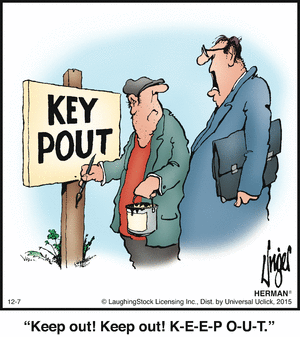If your teacher ever made you memorize the beginning of The Canterbury Tales, you may remember this line:
- Whan Zephirus eek with his swete breeth,
Which just means
- When Zephyr [the West Wind] also with his sweet breath.
The word I want to draw your attention to is eek. It means “also.” Eek didn’t survive into modern English, except in one little linguistic fossil that I find fascinating.
Imagine you live in medieval England. Your parents named you Matilda, but all your friends call you The Reaper. In that case, you could be said to have an eek name—an also-name. Matilda is your real name, The Reaper is an eek name.
Especially in a world where not many people could read, it’s not hard to see how an eek name could be mistaken for a neek name, which ultimately becomes a nickname.
Something similar happened with the Middle English naddre, the word for the only venomous snake in the British Isles. A naddre became an addre and an adder.
There’s a name for the linguistic process by which an eek name becomes a nickname and a naddre becomes an adder (and a napron becomes an apron and a norange becomes an orange). There are several names, actually. This process is called “rebracketing” or “juncture loss” or “false splitting,” all of which sound more like relationship problems than linguistic terms. I will stick with “rebracketing” for the remainder of this letter, because it feels more down-to-earth than “juncture loss” and less judgmental than “false splitting.”
Bracketing
Any time you hear a string of syllables, your brain goes to work bracketing those sounds into units of meaning.
Your ears hear dijooseethatrobin, and somehow your brain knows to divide those sounds like this:
- [Did] [you] [see] [that] [robin]?
Or, in a different context, with the slightest change of intonation, you might know to bracket things off like this:
- [Did] [you] [seethe] [at] [Robin]?
Let us pause for a moment and marvel at the fact that you get this bracketing right almost all the time. Sure, you get it wrong sometimes, like this guy:

But the miracle is that we’re not making that kind of mistake all day every day.
This bracketing happens not only between words, but also within words. Think prefix-root-suffix, or verb endings, or the parts of a compound word. Let’s use the word rebracketing as an example. Even if you have never heard or seen this word before, you know to break it into three parts:
- [re] + [bracket] + [ing]
You know what bracket means, you know that the –ing suffix turns a verb into a noun, and you know that the prefix re– means you are doing something again. So even if you’re vague on the specifics, thanks to your experience as a bracketer, you know how to start making sense of the word.
Rebracketing
If bracketing is a process that language users almost always get right, rebracketing grows out of that tiny fraction of cases in which we get it wrong.
Consider the hamburger. The hamburger is named for Hamburg, Germany. Just as a person from Pittsburgh is called a Pittsburgher or a person from New York is called a New Yorker, a sandwich from Hamburg is called a hamburger. It’s straightforward stuff—a root and a suffix:
- [Hamburg] + [er].
But for some reason it is hard to resist the idea that the word splits this way:
- [ham] + [burger]
In this rebracketing, burger is the root and ham- is a prefix telling what kind of burger we’re talking about (this in spite of the fact that hamburgers were never made out of ham). Burger has proven to be a productive root word. Put cheese on this sandwich, and it becomes a cheeseburger. Make a patty out of vegetable matter, and you have a veggie burger.
The word helicopter presents another interesting case of rebracketing. It feels as if its constituent parts should be [heli] + [copter], which is why we have helipad and police copter. In fact, the word is made of these parts:
- [helico] + [pter].
Helico means “spiral” (as in the helical structure of a DNA strand) and pter means “wing” (as in pterodactyl, “wing” + “finger”). A helicopter is a flying machine with spiraling wings.
And then there are the –doodle dogs. Except for Labradoodle, all of the –doodle names for customized dogs are a result of rebracketing. In a case of linguistic propagation exactly mirroring biological propagation, a Labradoodle is a cross between a Labrador retriever and a poodle: [Labrad] + [oodle]. But the word almost immediately got rebracketed [Labra] + [doodle], making possible the Goldendoodle, the Aussiedoodle, and the Doxiedoodle. That last one seems like a wasted opportunity. Shouldn’t a cross between a dachshund and a poodle be called a Weeniedoodle?
Rebracketing and Loan Words
Rebracketing frequently happens with foreign loan words. The word alligator is a corruption of the Spanish el lagarto, “the lizard.” Some Floridian, I suppose, was a little vague on the fact that el is just Spanish for “the” and stuck it to the front of the word, right up next to its toothy snout.
For the same reason, many of the words we get from Arabic start with al: algebra, algorithm, alcove, albatross, alfalfa, alchemy, alcohol. Al is just the Arabic word for the.
Alcoholic gets the double-whammy when it comes to rebracketing. We just saw how the al– got attached to the front end of the word via rebracketing. But in a second act of rebracketing, the back end, -oholic, has also come to be treated as a suffix meaning “addict.” So now there are workaholics, shopaholics, chocoholics, etc.
I will end with the story of outrage, a word whose etymology I only recently learned. It has become my new favorite example of rebracketing.
Outrage derives from the French:
- [outre] + [age].
Outre in Old French meant “beyond.” It is closely related to the Latin ultra. And that suffix -age turns outre into a noun. So etymologically speaking, outrage means something like “beyondness.” To commit an outrage would be act in a way that goes beyond the limits of decency, morality, etc.
To a speaker of English, however, outrage looks like it should divide like this:
- [out] + [rage]
It looks like something you would feel—a rage that spills out. So outrage has also come to mean the way you feel toward someone who has committed an outrage. It has even taken on a quasi-verbal form: “I am outraged!” Thanks to rebracketing, outrage has come a long way in the English language.
None of this counts as writing advice, of course. I can’t think of any way this knowledge will improve your writing. It’s just interesting. Don’t you think?








